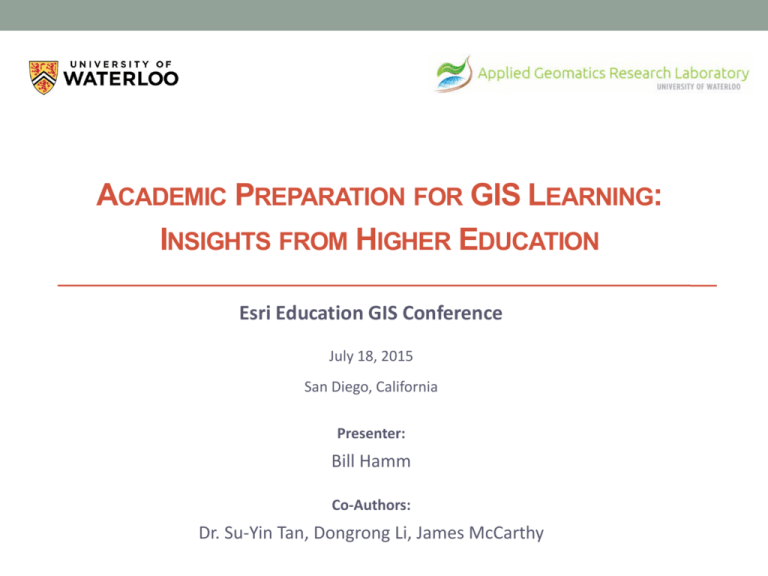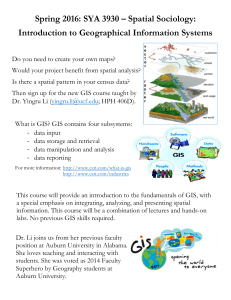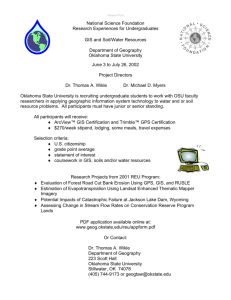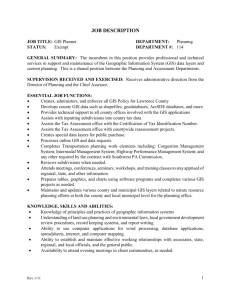Academic Preparation for GIS Learning: Insights from Higher
advertisement

ACADEMIC PREPARATION FOR GIS LEARNING: INSIGHTS FROM HIGHER EDUCATION Esri Education GIS Conference July 18, 2015 San Diego, California Presenter: Bill Hamm Co-Authors: Dr. Su-Yin Tan, Dongrong Li, James McCarthy 2 INTRODUCTION • Students are diverse in academic backgrounds • GIS learning involves a multidisciplinary approach, which can be enhanced by other prior academic knowledge and experience • Virtually no empirical studies have examined students’ academic preparedness for undertaking GIS learning in higher education • Based on a survey conducted in an introductory GIS course at the University of Waterloo, the study investigates if there are any statistically significant differences in students’ academic backgrounds for proficient GIS learning 3 GEOGRAPHIC INFORMATION SYSTEM (GIS) …an information technology that is designed to store and process spatially referenced data, which enables visualizing spatial patterns, relationships, and trends What about students in learning? Figure 1. Components of a GIS (Source: imgbuddy.com) 4 5 1) SELF-RATED ACADEMIC PREPAREDNESS • Students self-rated their own preparedness • Only 14.8 % of students indicated ‘fully prepared’ to undertake GIS learning • A one-way ANOVA was conducted Students self-rated as ‘fully prepared’ performed statistically significantly better, F(2,600) = 5.66, p = 0.004 6 2) TYPE OF ACADEMIC BACKGROUND • Students self-identified their type of academic background as ‘Quantitative,’ ‘Qualitative,’ and ‘Multidisciplinary’ • A one-way ANOVA was conducted Students self-identified as ‘quantitative’ performed statistically significantly better, F(2,600) = 3.38, p = 0.035 7 3) STUDY MAJOR No statistical significance is found across different major areas of study for the academic performance, F(5, 573) = 1.227, p = 0.295 8 4) PRIOR CORE SUBJECT KNOWLEDGE Students with prior learning experience in math, programming, and GIS performed statistically significantly better, t(601) = 3.992, 3.092, and 2.358, p = <0.001, 0.019, and 0.002, respectively 9 4) PRIOR CORE SUBJECT KNOWLEDGE • Prior core subject knowledge was identified, which (statistically significantly) supported more proficient GIS learning - Math, Programming, (Previous) GIS • How many of those prior core subjects should students take? There was a statistical significant difference on academic performance by the number of those prior core subjects learned, F(3, 602) = 11.150, p < 0.001 Statistical significance is found between: • Three • Two or One • None The first choice should be Math, then GIS, then programming 10 4) PRIOR CORE SUBJECT KNOWLEDGE “Least cost pathway was similar to the concept of ‘optimization principle’ in math.” “Raster concepts were perceived to be easier because of prior computer programming experience.” ~ GEOG/PLAN 281 Intro. to GIS Student 11 CONCLUSIONS AND FUTURE WORK • GIS learning can be affected by students’ academic backgrounds • The study revealed which academic backgrounds are statistically significant for proficient GIS learning • Math could be considered as a pre-requisite prior to undertaking GIS learning in higher education • In the future, the study will explore how students’ academic backgrounds may affect grasping specific GIS knowledge areas and concepts easier or more difficult 12 Thank you!





